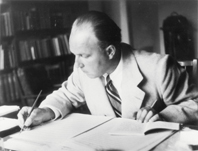| Ernst Krenek 1900-1991 |
In the early 1920s, when Krenek’s chamber music first became well known through his participation in the avant-garde music festivals in Donaueschingen and Salzburg, he was seen as a representative of “new” music—a form of music that responded to the reshaping of society after 1918 and to the accelerated developments in technology by counteracting the high expectations of art with humor and timeliness. A typical example of this attitude is the genre of the Zeitoper or contemporary opera, which Krenek also worked with. Yet, even then Krenek did not follow a specific pattern in working on his compositions: shortly before his contemporary opera Jonny spielt auf became a smash-hit, his expressionistic opera Orpheus und Eurydike, based on a play by Kokoschka premiered, and even prior to this (many years before Brecht’s attempt) Krenek had already written an “epic” music-theater piece, Zwingburg (1922). Back in the early 1940s in the USA, he had already begun to experiment with sequence rotation in his Third Piano Sonata (which later became one of Glenn Gould’s favorite pieces) and the great a capella work Lamentatio Jeremiae Prophetae—in doing so, he did not seek to push the dodecaphony further in the direction of serialism, but instead to create a bridge to modal music. Significantly, his interest in linking this to history arose in the early years of exile, a time when Krenek feared that his loss of Europe could lead to a loss of history altogether. This played an audible role in his later works as well. During this phase, there are two particularly remarkable elements: the juxtaposition of phrasal techniques and historical elements (with quotations or allusions, also to some of his earlier works) and the breaking up of the work’s continuity into fragments. The one insured his compositions a place within (his own) history, while the other enabled him to reflect on them as irrevocably fragmented—giving him the ability to express his refusal to downplay the specific break in history, one of the most incisive experiences that the twentieth century inflicted upon its contemporaries. Claudia Maurer Zenck Chairwoman of the Ernst Krenek Artistic and Academic Advisory Board Courtesy of www.krenek.at |
| SOLOS | |
| Title (click for further info) | Instrumentation |
| Sonata for Harp op. 150 | Solo Harp |
| ENSEMBLE MUSIC | |
| Title (click for further info) | Instrumentation |
| Aulokithara op. 213a - Score only Electronic Tape now available as CD by special order. |
Oboe, Harp & Electronic tape |
 Even during his lifetime, Ernst Krenek, who left behind an oeuvre of more than 240 operas when he died at the age of 91, held quite an extreme position in music history. Because of his great versatility, critics in Europe often spoke of him as constantly changing his “style of composing,” tacitly implying that a creative life must be stylistically uniform. In the United States, however, he was deemed the “one-man history of twentieth-century music,” a unique and nearly unbelievable fact Krenek lived up to through his creation of work that spans more than seven decades of the twentieth century, from the end of the 1910s until the end of the 1980s. When taken seriously, this bon mot does not refer to the temporal concordance of his works or his participation in the latest developments in music throughout his life; it rather points to his role as a twentieth-century contemporary.
Even during his lifetime, Ernst Krenek, who left behind an oeuvre of more than 240 operas when he died at the age of 91, held quite an extreme position in music history. Because of his great versatility, critics in Europe often spoke of him as constantly changing his “style of composing,” tacitly implying that a creative life must be stylistically uniform. In the United States, however, he was deemed the “one-man history of twentieth-century music,” a unique and nearly unbelievable fact Krenek lived up to through his creation of work that spans more than seven decades of the twentieth century, from the end of the 1910s until the end of the 1980s. When taken seriously, this bon mot does not refer to the temporal concordance of his works or his participation in the latest developments in music throughout his life; it rather points to his role as a twentieth-century contemporary.